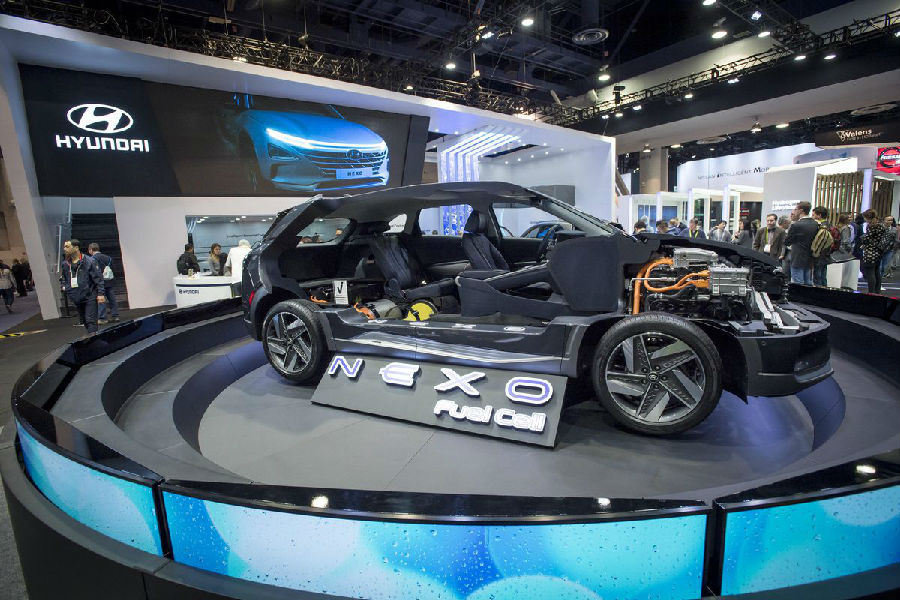Readers of a certain age are now permitted to roll their eyes. At least twice in the past 50 years—in the 1970s, after the oil crisis,
某個年齡層的讀者會表示不相信。在過去50年里——在20世紀70年代,石油危機之后
and in the 1990s, when climate change started to acquire political salience—
以及在20世紀90年代,當氣候變化開始獲得政治關注的時候——
there has been excited talk of replacing hydrocarbons with hydrogen. It didn't happen.
至少出現了兩次用氫取代碳氫化合物的令人興奮的討論。它沒能成真。
There were several reasons for this. For a start, ripping up and replacing the world's fossil-fuel infrastructure is a huge job.
對此有幾種原因。首先,取消并替換世界上的化石燃料基礎設施是一項大工程。
And even were that an easy thing to accomplish, hydrogen itself has drawbacks.
即便這是件很容易完成的事情,氫本身也有缺點。
Though better than batteries, it stores less energy in a given volume than fossil fuels can manage.
雖然它比電池更好,但在一定體積內,它所儲存的能量比化石燃料要少。
More important, it is not a primary fuel. You have to make it from something else.
更重要的是,它不是初級燃料。你需要從其他物質中獲取它。
This can be done by a chemical reaction called steam reforming but, besides steam,
通過一種被稱為蒸氣重組的化學反應可以得到它,但除了蒸氣,
the other ingredient of that process is a hydrocarbon of some sort, which rather defeats the object of the exercise.
這一過程中的其他原料是某種碳氫化合物,它與這個過程的目的相抵。
Or it can be done by the electrolysis of water.
也可以通過電解水來實現。

This has appropriate green credentials as long as the electricity is either from renewable sources or a nuclear-power plant.
只要電力來自可再生能源或核電站,這就具有適當的綠色資質。
But the laws of thermodynamics mean that the energy content of the hydrogen
但熱力學定律意味著
which comes out of the process is less than the electricity that went in.
從這個過程中產生的氫的內能比進入的電流要少。
This inbuilt inefficiency raises the question "why not simply power the end-use electrically, rather than using hydrogen as an intermediary?"
這種固有的低效率引發了一個問題,“為什么不直接用電來驅動最終用途,而是要將氫作為一種媒介呢?”
To counter these arguments those who believe that things hydrogen-related really are different this time around can point to two things in their favour.
要反駁這些爭論,那些認為和氫有關的事物這次真的會有不同的人可以指出對他們有利的兩個點。
Several of the relevant technologies, notably electrolytic equipment,
一些相關技術,尤其是電解加速設備,
are now at a stage where it is possible to believe they might soon become cheap enough to do the job.
目前正處于一個可以相信它們很快就會變得足夠便宜的階段。
And the idea that economies need to be decarbonised fully in order to curb climate change is gathering speed.
經濟需要完全脫碳化以遏制氣候變化的想法正在逐漸加速。
Until 2019, for instance, Britain had planned to cut carbon emissions by 80% from their levels in 1990 by 2050.
例如,直到2019年,英國計劃,在2050年前,將碳排放量在1990年的水平上減少80%。
It then, however, upped the ante to become the first big economic power to commit itself to a 100% cut. This has implications for hydrogen.
但英國提高要求,要成為首個承諾100%減排的經濟大國。此舉對氫能有影響。
Electrification using renewable sources such as wind and solar power would probably have got the country to 80%,
David Joffe觀察稱,使用風能和太陽能等可再生能源的電氣化可能會讓英國減排率到達80%,
observes David Joffe, a member of the Committee on Climate Change (CCC),
他是英國氣候變化委員會(CCC)的成員,
an organisation that advises Britain's government on how to bring the transformation about.
該組織為英國政府提供如何實現轉型的建議。
But full decarbonisation, he says, is a much bigger task, and one for which hydrogen may prove necessary.
但全面脫碳化,他說,是一項更艱巨的任務,并且可能會需要氫。
譯文由可可原創,僅供學習交流使用,未經許可請勿轉載。












